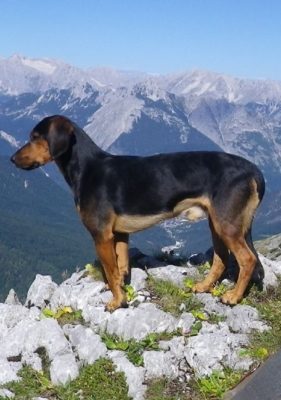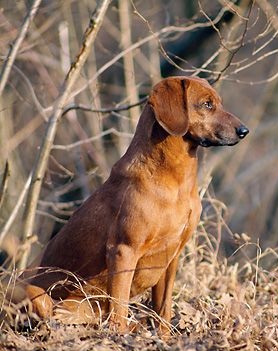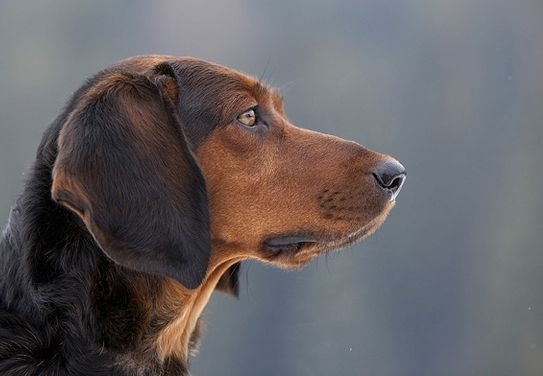Tyrolean Hound
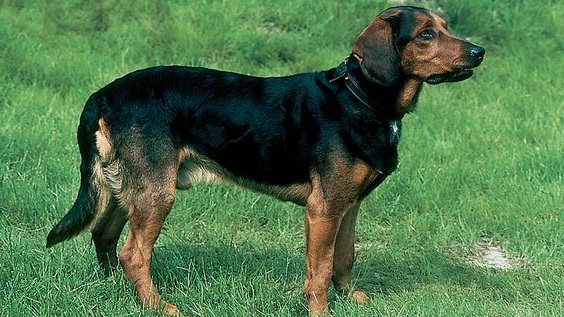
Thanks to the harsh weather conditions encountered by the Tyrolean Hound ancestors, the breed has acquired stamina, great energy, and an active lifestyle. The Hound is not an indoor dog; it needs to be outdoors all the time. Therefore, the countryside is most suitable for the dog. This breed needs activity and plenty of exercises; otherwise, the lack of it will lead to aggression, disobedience, and mischief at home.
Table of Contents
Breed Information
| Another Name | Tiroler Bracke, Tyroler Bracke |
| Origin | Austria |
| Height | Males 44-50 cm Females 42-48 cm |
| Weight | 25-35 kg |
| Fur | Tight, well-fitting, with undercoat |
| Color | Red, black and tan; with white markings |
| Lifespan | 12-14 years |
| FCI Classification | Scent hounds and related breeds |
| Group | Hunting dogs |
| Price | $500 |
Breed Photos
Origin History
The homeland of the Tyrolean Hound is Austria. It was in Tyrol that representatives of this breed were hunted by Emperor Maximilian I in 1500. The hound has gained popularity in Europe, but it is more common in its homeland.
The Tyrolean Hound is quite different from many European hounds. The breed has three varieties at once: coarse-haired, hard-haired, and smooth-haired.
The bold Tyrolean Hound was bred to hunt in bad weather conditions in the alpine mountains’ heights. Fox, rabbit, and deer are the main game of the hound when hunting. During this activity, the Tyrolean Hound reveals its best side, shows its purposeful character, and demonstrates interaction with the owner.
Appearance
The hound has a very strong body and muscular chest. The head is wedge-shaped, the eyes are large, the ears are soft and rounded at the ends. The bite is scissor-shaped. The tail is long and set high. The coat is rigid and close to the body, which very well protects against bad weather conditions. Color standard in red or black with red underpants with white markings on the chest and neck, but it will not be considered a defect if the markings are absent.
Character
Thanks to the harsh weather conditions encountered by the Tyrolean Hound ancestors, the breed has acquired stamina, great energy, and an active lifestyle. The Hound is not an indoor dog; it needs to be outdoors all the time. Therefore, the countryside is most suitable for the dog. This breed needs activity and plenty of exercises; otherwise, the lack of it will lead to aggression, disobedience, and mischief at home.
The hound is friendly to all strangers. The breed has a highly sensitive sense of touch and an excellent sense of smell, as well as observation. Many people breed the hound as a hunter; it does an excellent job in this role. With children is always affectionate and finds a common language.
Being in the family, the dog will be happy, but the owner always chooses one person. The education of the dog can show a stubborn nature. The presence of the Tyroler Bracke near means a constant and incessant ringing of barking. Even as a puppy, it is necessary to encourage the dog’s quiet and calm behavior at home so that it does not bark without reason. The hound loves bodies of water and will not miss an opportunity to bathe.
Other animals can arouse the hunting instinct. The Tyrolean Hound’s temperament can sometimes hurt smaller breeds while playing; it inadvertently shows its activity and does not always control force. But socialization with other dogs is the foundation in training.
Care
Grooming the dog does not require much effort from the owner, but it needs to devote its time. The hound has a tough undercoat; once a week, it is necessary to comb the pet well with a special brush. It is recommended to bathe the dog once in several months, but it should be done regardless of the schedule after hunting.
After a brisk walk, your dog can bring all kinds of debris and even parasites on his coat. It is necessary to inspect the coat carefully and not forget the scheduled visit to the veterinarian. Claws should be of an appropriate length. Mouth hygiene can be maintained with appropriate treats that clean plaque on the teeth.
Training
The owner must show all his desire and original approach in training so that the lessons were like a game, but the dog took them very seriously. The Tyrolean Hound can perform various commands and tricks, but it requires patience. It is important not to forget to encourage the dog with treats. As for hunting, an inexperienced dog always takes the example of its brethren, working as a team.
Common Diseases
The Tyroler Bracke has a strong immune system. It is all thanks to the cold climate of Austria, where the dog takes its origins. In general, the dog’s health should be monitored, do not ignore the changed behavior and passivity, do routine vaccinations, and visit the veterinarian.
The Tyrolean Hound has a predisposition to:
- parasites;
- hip dysplasia;
- stroke;
- cardiosclerosis;
- conjunctivitis;
- hyphema.
Nutrition
The Tyrolean Hound needs a balanced diet, and part of the diet should consist of protein of animal origin. To avoid overeating, the portion should not be too large. If the dog suddenly refuses to eat, this should raise questions. In this case, you should observe him for a few days and take him to the vet.
On days of special physical activity, the portion should be increased. Liquid porridge and soups would be excellent alternatives. Sweets are strictly forbidden in any form. Do not forget about water, which should be left in the open.
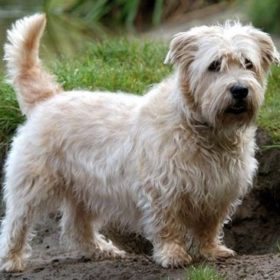 Glen of Imaal Terrier
Glen of Imaal Terrier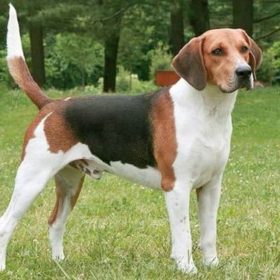 Beagle-Harrier
Beagle-Harrier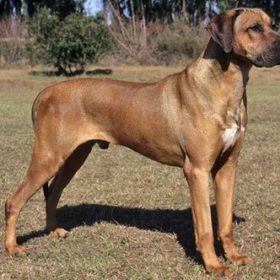 Rhodesian Ridgeback
Rhodesian Ridgeback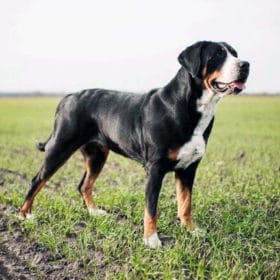 Greater Swiss Mountain Dog
Greater Swiss Mountain Dog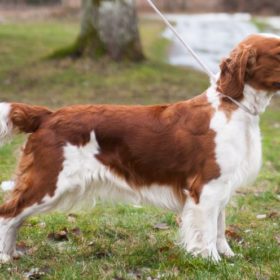 Welsh Springer Spaniel
Welsh Springer Spaniel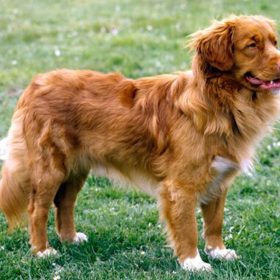 Nova Scotia Duck Tolling Retriever
Nova Scotia Duck Tolling Retriever